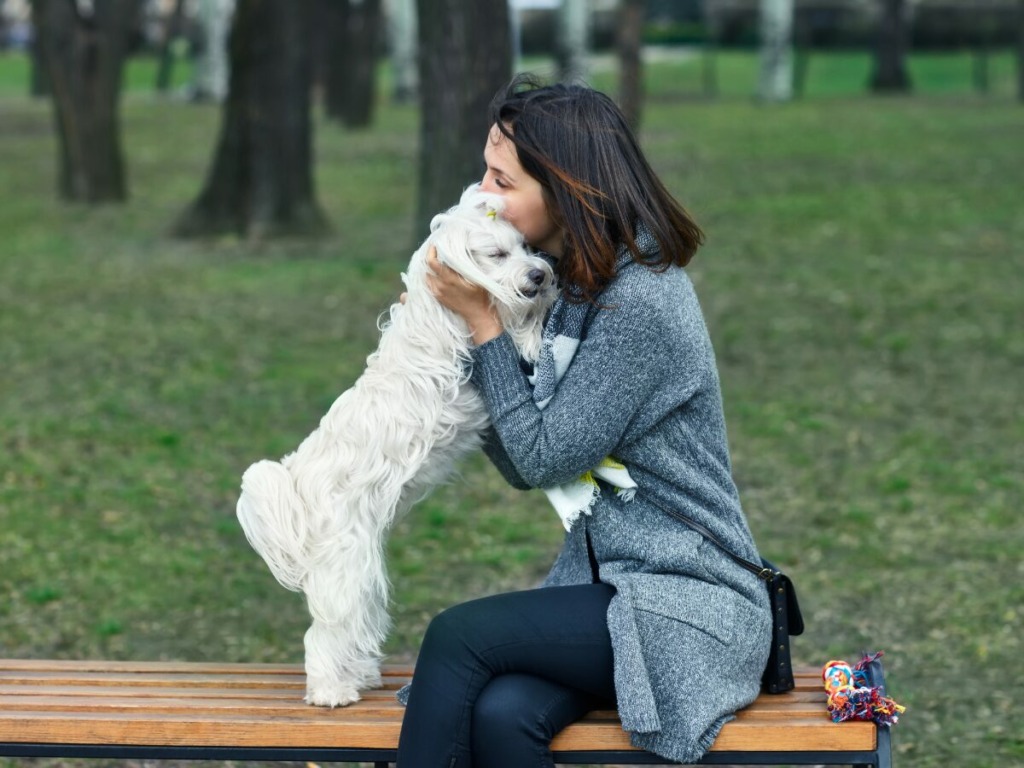Have you ever wondered, can dogs have autism?
Autism, a complex condition often characterized by social and communication difficulties, is widely recognized in humans.
But when it comes to our canine companions, the idea of autism is still a subject of much debate and research.
In this blog, we’ll dive into the concept of canine autism, exploring whether dogs can indeed experience a condition akin to human autism. Let’s get started!
What Are the Symptoms of Autism in Dogs?
Identifying canine autism symptoms can be challenging, but being aware of the behavioral signs of autism in dogs is crucial for understanding our canine friends. So, what exactly should pet parents look out for?
Here’s a breakdown:
- Repetitive Actions: Dogs with autism may exhibit repetitive behaviors, like spinning or tail-chasing.
- Social Challenges: They might seem less interested in socializing with other dogs or people.
- Routine Dependence: A strong preference for routine and stress when it’s disrupted can be a sign.
- Sensory Sensitivities: Unusual reactions to sounds, textures, or lights are common in dogs with potential autism.
- Training Difficulties: These dogs might not respond well to traditional training methods, indicating possible canine autism symptoms.
Understanding these behavioral signs of autism in dogs is crucial for proper care and support. Remember, each dog is unique and these symptoms alone don’t confirm autism.
How Is Autism Diagnosed in Dogs?

Autism in dogs diagnosis is a bit tricky, as there’s no standard dog autism test like for humans. However, veterinarians and behaviorists use various methods to assess autism-like symptoms in dogs.
Here’s a quick rundown:
- Behavioral Assessment: The primary method involves observing the dog’s behavior. Specialists look for signs like repetitive actions and social interaction difficulties.
- Veterinary Evaluation: A vet will rule out other medical conditions that might cause similar symptoms, ensuring the focus is on potential autism.
- Environmental Review: Understanding the dog’s environment is crucial. Factors like past trauma or lack of socialization can mimic autism-like behaviors.
- Consultation with a Behaviorist: Often, experts in canine behavior are involved to make a more informed assessment.
Remember, a diagnosis of autism in dogs isn’t straightforward. If you suspect your dog shows signs, a thorough evaluation by professionals is the best course of action.
Discover the insights in our recent post about Outdoor Adventures: How to Make the Most of Outdoor Play with Your Dog?
Are Some Dog Breeds More Prone to Autism?
When exploring autism in different dog breeds, it’s natural to ask: can dogs have autism more frequently in certain breeds? While research is ongoing, some trends suggest a possible link.
Breeds known for their high intelligence and sensitivity, such as German Shepherds and Border Collies, have occasionally shown behaviors that mirror autism, like repetitive actions or social challenges.
Conversely, more relaxed breeds like Labradors and Golden Retrievers are less frequently associated with these behaviors.
However, it’s essential to remember that these observations don’t definitively prove certain breeds are more prone to autism. Individual variation is significant, and a dog’s environment and upbringing also play crucial roles.
So, while autism in different dog breeds is a fascinating topic, it’s important to view it as part of a broader, more complex picture of canine behavior and health.
Understanding the Canine Autism Spectrum
When we talk about the canine autism spectrum, we delve into understanding dog autism in its varied forms. The idea is similar to the human autism spectrum, suggesting that symptoms in dogs can range from mild to severe.
In some dogs, the signs might be subtle, like a slight difficulty in socializing or particular sensitivities to sensory stimuli. Others might exhibit more pronounced symptoms, including intense repetitive behaviors or significant challenges in interacting with other dogs or humans.
The key to understanding dog autism lies in recognizing this diversity. Just as each human with autism is unique, so too are dogs. This perspective is crucial for pet owners and veterinarians, as it calls for personalized care and approaches tailored to each dog’s specific needs and behaviors.
By exploring the canine autism spectrum, we’re not just labeling behaviors; we’re enhancing our understanding of canine mental health and well-being, paving the way for better support and acceptance of all our four-legged friends.
Treating Autism in Dogs: What Are the Options?
The approach to dog autism treatment is as varied as the dogs themselves. Establishing a structured routine helps autistic dogs feel secure.
Sensory enrichment is vital, and products like the Puppy Toy Mat can aid in this, providing varied textures and stimuli in a safe, controlled manner.
Behavioral therapies, often with a professional behaviorist, focus on improving social skills and reducing anxiety.
Veterinary care is also crucial, not just for health check-ups but for managing any related symptoms like anxiety. Education for owners is key in support for autistic dogs, ensuring a supportive and understanding environment.
Table: Comparing Behavioral Therapies for Autistic Dogs
| Therapy Type | Description | Benefits |
| Structured Routine | Consistent daily schedule | Reduces anxiety, adds predictability |
| Sensory Enrichment | Gradual introduction to new stimuli | Enhances adaptability, lowers sensitivity |
| Professional Behaviorist | Custom behavior modification strategies | Improves social skills, lessens anxiety |
| Veterinary Care | Health management and symptom treatment | Addresses physical health, enhances well-being |
| Owner Education | Learning about autism in dogs | Improves care, increases understanding |
This table highlights the multifaceted approach required in treating and supporting autistic dogs, emphasizing the need for personalized care plans.
Training Strategies for Dogs with Autism
When training autistic dogs, patience and understanding are key.
Here are some effective strategies to help your special furry friend:
- Positive Reinforcement: Always use positive reinforcement. Rewards like treats or affection make training a more enjoyable experience for dogs with autism.
- Consistency is Crucial: Maintain a consistent training routine. Regularity helps autistic dogs understand what to expect, reducing anxiety.
- Keep Sessions Short: Training sessions should be short and sweet to prevent your dog from feeling overwhelmed.
- Minimize Distractions: Choose a quiet, familiar environment for training. This helps in keeping your dog’s focus on you.
- Customize Training Methods: Tailor your approach to your dog’s specific needs. Some autistic dogs might respond better to visual cues than verbal commands.
- Patience and Understanding: Be patient and understanding. Progress might be slower, but it’s all about celebrating the small victories.
When training autistic dogs, the journey is as important as the destination. It’s all about building a stronger bond and understanding between you and your canine companion.
The Social Challenges Faced by Autistic Dogs
Understanding autistic dog behavior involves recognizing the social challenges faced by these dogs. These challenges can affect how they interact with other dogs, pets, and humans.
Let’s break down some specifics:
- Reduced Social Interaction: Autistic dogs may show less interest in interacting with other animals or people, which is part of their unique behavioral pattern.
- Struggle with Social Cues: They often have difficulty interpreting and responding to social cues from others, potentially leading to misunderstandings.
- Preference for Solitude: Many autistic dogs prefer being alone or with a familiar person, avoiding crowded or noisy environments.
- Inconsistent Social Responses: Their reactions in social situations can vary greatly, showing comfort at times and anxiety at others.
- Stress in New Environments: New social settings can be overwhelming, and these dogs may need extra time to adapt.
Understanding these social challenges in autistic dogs helps in tailoring their environment to their needs, ensuring they feel safe, loved, and comfortable in their daily lives.
Canine Neurodiversity: Embracing Different Behaviors
Canine neurodiversity is all about appreciating and accepting the unique quirks and behaviors in our dogs, including those that might fall under canine behavioral disorders. This concept encourages us to view autism in dogs not just as a condition, but as a part of the vast spectrum of canine personalities.
In comparing autism to other canine behavioral disorders, it’s important to see these behaviors not as defects but as variations in the canine world.
Just as in humans, neurodiversity in dogs encompasses a range of behaviors and tendencies, from autism-like traits to anxiety or obsessive behaviors.
By embracing canine neurodiversity, we learn to appreciate our dogs for their individuality. This mindset shifts our focus from trying to ‘fix’ our dogs to understanding and supporting them.
It’s about creating a nurturing environment that recognizes and respects their unique needs, allowing them to thrive and enrich our lives with their distinct personalities.
The Importance of Mental Health in Pets

Talking about pets and mental health is crucial in today’s pet care conversations.
Just like humans, our furry friends experience a spectrum of mental health issues. Recognizing and addressing these concerns is key to their overall well-being.
Mental health in pets encompasses everything from anxiety to more complex conditions like those discussed in canine neurodiversity. It’s not just about physical health but their emotional and psychological state plays a massive role in their quality of life.
By paying attention to their mental health, we ensure our pets lead not only healthy but also happy lives. It’s about creating a nurturing environment that caters to their physical as well as mental needs.
Conclusion: Embracing and Supporting Autistic Dogs
It’s essential to underscore the importance of understanding, embracing, and supporting dogs with autism. Recognizing the unique challenges and needs of these dogs allows us to provide them with a more compassionate and tailored care approach.
By acknowledging and accepting their differences, we not only enhance their quality of life but also strengthen the bond we share with our canine companions.
Remember, every dog, autistic or not, deserves love, understanding, and a happy, fulfilling life.
Get the Best for Your Special Friend with HoundGames!
Looking to enrich your special friend’s life? Dive into the world of HoundGames!
Discover engaging dog toys and expert insights tailored to foster happy, healthy bonds between you and your furry friend. Whether it’s playtime or learning, our resources are designed to support dogs of all stripes, including those with special needs.
Visit us at HoundGames.com and start a new journey of understanding and joy with your beloved pet today!




